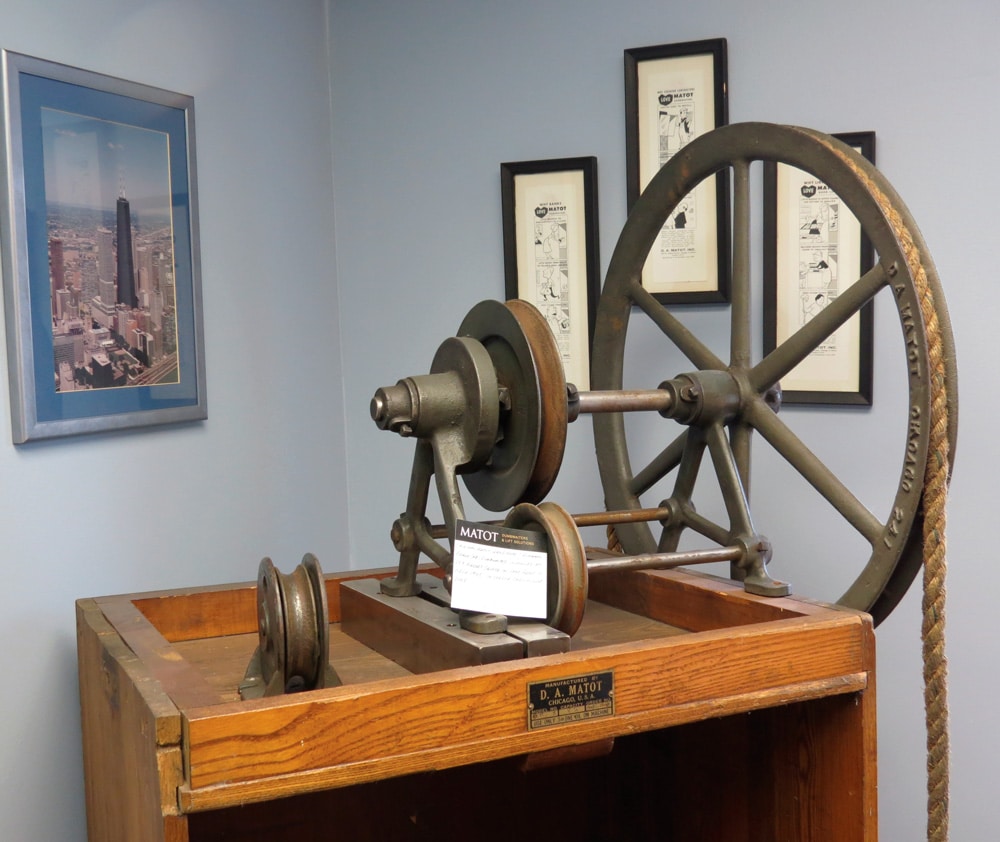Jim Peskuski
Aug 1, 2016

After a long and colorful career with dumbwaiter company Matot, Jim Peskuski has no regrets.
During his nearly 45 years in the industry, Jim Peskuski has seen it from many different and interesting angles. Born and bred in the Chicago area, the executive vice president of sales for Chicago dumbwaiter company Matot has enjoyed his long career, and he doesn’t intend for it to stop just yet. In July, Peskuski went from full time to a less hectic workweek. He explains:
“I want to keep my hand in it. I have so many friends in the industry and still find it very fascinating. I like to take potential applications and see them evolve into something that really works. I just love that.”
Peskuski says the years have “flown by,” and that his career has given him the opportunity to travel and meet fascinating people all over the country. With a rich history dating back to 1800s Chicago, Matot is a “small business that deals with big businesses,” and Peskuski has enjoyed being an integral part of that. He has been involved in American Society of Mechanical Engineers (ASME) code development for decades, regularly attending meetings and serving as chair and vice chair of committees. He plans to continue that involvement, which he describes as “dry but interesting.” He jokes, “Sometimes you just get that pleasure of that 3-hr. argument over the redundancy of a switch.”
If you want a crazy or fun elevator story, Peskuski is the one to go to. One of his best involves monkeys. He recalls:
“The most interesting sales call I ever went on had to be when I got a service call for a broken-down dumbwaiter at Parke-Davis’ headquarters outside of Detroit. It was one of the largest drug companies at the time (later, through acquisitions, it became Pfizer), and they performed drug testing on animals in their research building. I asked the independent elevator guy, who was going with me, if he knew about the dumbwaiter, and he said, ‘Oh, we know it — they take all the monkeys they infect with diseases up and down in it.’ I thought, ‘Oh God, what have I gotten myself into?’”
What Peskuski and his colleague had gotten themselves into was having to visit the onsite nurse for immune-system-boosting shots in the buttocks before being allowed to enter the building to examine the equipment. They ended up selling Parke-Davis the dumbwaiter replacement parts, but not without some trials and tribulations. “It was the weirdest sales call I’d ever seen in my life,” Peskuski says. “My butt hurt all the way back on the plane.”
The only other job Peskuski held before joining Matot was owner of a roofing company — an enterprise he launched after graduating from Illinois State University at Bloomington with a double major in Business Administration and Economics. He met and married his sweetheart, Janice, in college, and the pair lived in married-student housing. They have three children, Aaron, Brian and Kristen, and seven grandchildren.
When Peskuski graduated, a recession was in place, and jobs were scarce for new graduates. With a baby on the way, Peskuski figured he needed to find a way to get some money rolling in, so he started the roofing company. “I think our net worth at the time was about US$40,” he jokes. While he was roofing, Peskuski remembered Matot — a place he had worked in college with a buddy whose dad was an engineer there. During holidays, such as Christmas and summer vacation, Peskuski and his friend did “dirty work,” including cleaning the grease off elevator rails.
He was fascinated by Matot, and applied there when an opportunity arose, despite “not having taken a single college dumbwaiter course.” Peskuski was hired, working under Ed Matot II, father of current company co-presidents CeCe and Anne Matot. His first job was to help the company price items. He recalls:
“They told me to go out in the shop and figure out what everything costs, so we know how to sell it and price it. I went and looked at all the dumbwaiter doors and different types of machines; it was all new and unique to me. I found out where the components came from, who we bought them from and what they cost. I learned the product pretty well that way.”
Peskuski’s second task was not enviable: Matot had recently decided to end longstanding exclusivity agreements with independent elevator companies in cities around the U.S., and it was Peskuski’s job to break the news face-to-face. “So, here was this young kid walking into people’s offices and telling them, ‘We appreciate your business for all these years, but now we have to sell to everybody else in the city.’”
Still, Peskuski ended up keeping relations intact with the independents, and becoming good friends with people who worked for the OEMs. Through these relationships, he has climbed around many a hoistway, enjoyed many a stunning view, examined all kinds of equipment and learned the business inside and out. “Sometimes I’d sit down with the owner of a company, and the next day I’d be having lunch at the barbecue place down the street with his mechanics and hearing their stories,” he says.
His memories of Matot are colorful. For instance, hand-rope dumbwaiters were made of wood as recently as the 1970s. Peskuski remembers selling Matot’s last hand-rope wooden unit in 1977. He has seen technology evolve. In the early 1980s, he says, staff members used to fight over the office’s sole electronic calculator that, at US$150, was viewed as a valuable and coveted piece of high-tech equipment.
Eventually, every employee had his or her computer and phone with all kinds of calculators built in. Today, digitization is vital to designing, manufacturing, shipping and handling paperwork — pretty much every aspect of doing business. Peskuski recently gave up his BlackBerry and is still trying to get used to his new iPhone as he mourns the loss of his nearly impossible-to-break flip phone.
In his spare time, Peskuski and his family enjoy traveling, boating and fishing. They have a vacation home in northwestern Wisconsin to which they escape as often as possible. Peskuski doesn’t always experience a relaxing vacation, however. He remembers a time when ice fishing with his son on the Minnesota-South Dakota border when their truck broke through the ice and fell 3 ft., resulting in “wives yelling at us for being careless” once they returned in their frozen clothes. Peskuski also enjoys reading (including rereading classic novels) gardening and home-improvement projects.
Among the ways Peskuski plans to stay involved with the industry is through the Chicago Elevator Association, which he had a large hand in running over the years alongside Richard Gregory. He remembers Gregory during the early days organizing racquetball tournaments among young industry members —including a just-starting-out Doug Witham — during weeknights. He observes: “Those were some pretty good times.” For Peskuski, no doubt, there are plenty more good times to come.
Get more of Elevator World. Sign up for our free e-newsletter.






